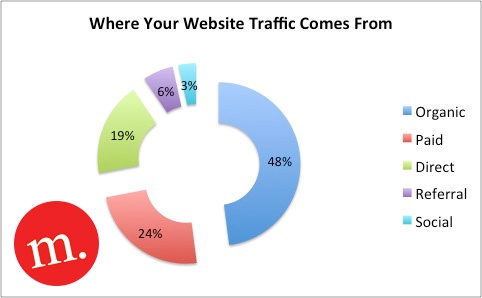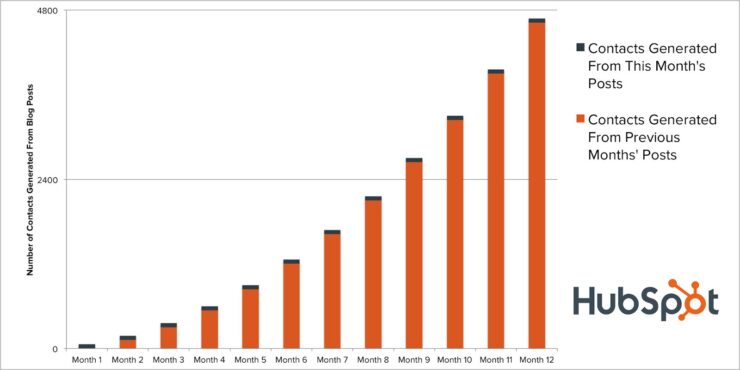Social media is used by nearly 4 billion people worldwide, making it easy for brands to incorporate social media into their digital marketing plans. Did you know that social media accounts for only 2% of B2B website traffic? Even less than 7% of the e-commerce website traffic for brands!
Perhaps that's why recent surveys show that CEOs don't believe social media is producing the results they need. Marketers often struggle to prove its effectiveness using metrics such as followers, impressions and sentiment. ).
Is social media a good digital marketing strategy? It can, yes, but it cannot be used alone. Brands must have a solid content marketing strategy that serves as the foundation and incorporate social media to amplify their message.
Quick Take-Aways
- Although CEOs think social media can help build a reputation, most feel it isn't effective in driving sales and conversions. (I agree!)
- Search engines account for more than 90% of all online experiences. Nearly half of all website traffic comes from search engines. Strong content marketing strategies are essential for companies to ensure that their content appears on search engines and drives traffic to their sites.
- Although social media shouldn't be the company's only source of digital marketing, it can complement content marketing and be most effective when they are combined.
Your First Marketing Hire Is For Social Media?
Too many small startups, B2B SaaS companies, and e-commerce businesses believe social media is so vital that they hire their first social media agency or person. Spending so much money and time on something that doesn't produce business results is a waste of time.
Advertising is where you should start. You know that banner ads can have 99 problems, and one click is not the solution. Advertising accounts for only 10% of B2B sales, and 20% for ecommerce businesses.
For most businesses, organic traffic is the best way to generate leads and revenue. Content marketing is the best way for organic traffic to your site and rank high in search engines. The best thing about content marketing is that it doesn't cost nearly as much as paid ads or social media.
What CEOs have to say about Social Media Marketing
Recent surveys have shown that companies believe social media is key to their digital marketing strategies.
Here are some quick stats that will give you an idea about the CEO's sentiment.
The 200 CEO respondents had much to say about social media's effectiveness in building customer reputation and engaging customers. However, it is not effective as a core marketing strategy nor a driver for real metrics that are important: sales and conversions.
Marketers who spent a lot over the past decade using metrics such as clicks, impressions and shares to show why social media is necessary and get CEOs on board are now faced with this unfortunate outcome.
Why is it that CEOs are still not happy with social media despite all the effort? It all comes down to the inability to connect social media metrics to the most important metrics for CEOs and the bottom line of a company: sales and conversions.
According to the same survey, 77% of CEOs believe that marketing will directly impact their bottom line. They reported that their top three priorities were new customers, sales growth, and lead generation. It is no surprise that they find it difficult to convince them about the importance of social media if they don't see how it affects what matters most.
[That is why our weekly blog content service focuses upon measurable results, including a monthly report to show our value. ]
Social Media isn't enough on its own
Social media can be a powerful tool to engage with your audience and monitor the sentiment surrounding your brand. However, it is not the best or most effective marketing strategy.
One thing to remember for companies using social media as their original source of content is that they do not own it. Content shared via social media is owned by the platform that posted it. They can redistribute it for their financial gain, even though you may consider it proprietary.
Indirect Connection to Conversion points
Driving customers to places they can make a purchase is key to driving sales. In most cases, this means your website. Although social media can help you expand your reach, build a brand personality and engage directly with your audience through engaging, it takes an extra click to visit your website and make purchases. It should not be the only way to drive traffic to your website.
Search Engines are a Top Choice for Consumers
Social media is not the best way to drive traffic to your site. Search engines are the answer. Search engines account for more than 90% of online interactions. People will search Google for information about a topic or company. It is much more effective to drive traffic to your site if you create content that ranks well on search engine results pages than any other social media post.
You Can't Control Placement
Purchased ads are a major factor in visibility on social media. Even if you invest in them, it can be hard to find out exactly where your content is placed and who is viewing it. It depends on which platform you use, it may be hard to find existing content after a few days, or even weeks, as it moves down your timeline, and other content is placed above it. The lack of control over the visibility of your content can lead to your best content getting lost in the mix and not being seen by potential customers.
What does this all mean?
Social media is a powerful tool to build your brand and create a community among your customers. It also gives you the opportunity to interact directly with them. Companies that want to see real results in their digital marketing efforts will need content marketing.
You might be skeptical, but despite all the effort and time brands invest in social media marketing, only 3 percent of their website traffic comes from social media, as opposed to almost half of those who use organic search.

Image Source: Mayoro Agency
Let's return to the search engine statistic. How can you drive traffic to your website if 93% of online experiences start with search engines?
Content marketing is the answer. Content Marketing is consistent publishing of content customers want on your website
Publishing content on blogs on companies' websites increases organic traffic. They also see longer-term, more profitable results (that don't require as much work), because the previously published content continues driving traffic long after it was published.
Get a Bonus: Watch my webinar about 10 tips to optimize your content marketing, including tips on how to automate social media.
Hubspot claims that 90% of their leads come from content published months ago or years ago.

Source: Hubspot
Integration is the key to integrating social media and content marketing into your strategy. Social media should not be your main source of content marketing, but it can be a great complement to the content you create.
You can increase your audience's exposure by linking your social media accounts to your website with clickable buttons. This will allow you to make your blog content shareable and display your social media feeds.
All of it together
It is understandable that CEOs are skeptical about whether social media can actually drive the results they desire — more revenue. The push and pull between executives and marketers can be solved with a strategy that uses social media as a tool, but not completely dependent on it for sales and conversions.
To learn more about how we can help you implement a content strategy that increases marketing ROI, visit our Content Builder Service.
Marketing Insider Group's post Why Social Media isn't Enough to Drive Your Business Growth originally appeared on Marketing Insider Group.
Frequently Asked Questions
What type of eCommerce Marketing Strategy should I follow?
There are three main types of eCommerce marketing:
- Direct marketing
- Search Engine Optimization (“SEO”)
- Social Media Marketing
Direct marketing involves sending emails directly to potential buyers. Emails could include coupons, discounts, or special offers. This type marketing aims at building customer loyalty and trust.
Search engine optimization is the process of improving your website's ranking in search engines such as Google, Yahoo!, and Bing. You'll get more traffic when your site appears near the top of results when people look up keywords related to your product or service.
Social media marketing uses websites such as Twitter, Facebook, Pinterest, Instagram, YouTube, etc. Connect with your audience. It is easy to use and free of charge.
Each of these techniques has its strengths and weaknesses. For example, SEO requires time and effort, while direct marketing doesn't require much effort. It is possible to miss the entire benefit of eCommerce marketing if your focus is on one method. We recommend combining multiple types of marketing.
For instance, you could send emails promoting your products and rank highly in search engine results. You can also advertise via social media and link to your site through those pages.
As you can see there are many options to market your eCommerce shop. Pick the best for you and make sure to implement them regularly. Good luck!
What are the most effective digital marketing strategies I can use from my home?
Digital marketing can be a great way to reach customers who spend their most time online. It's also an excellent opportunity to generate leads for your business.
You can use social media platforms like Facebook, Twitter, and LinkedIn to promote your brand. You can also use email marketing tools to send emails to potential clients and prospects.
There are many ways to market your product/service using digital media.
These channels can be used effectively if you have the right knowledge.
How to build an Ecommerce marketing plan?
The first step in selling is to determine what you want. It should be related to your business. However, it should also include enough variety to keep customers interested.
The second step is determining how much money you need to spend on advertising, promotions, and other marketing techniques. Multiple methods may be required, including direct mail, email blasts and social media sites. Search engine optimization is another option.
Once you've determined how much money you require, you can create a budget. If you're unsure which marketing method would be best for your business, you might consider asking a professional specializing in e-marketing. They will help determine the best method for you.
Once you have your plan in place you can begin to implement it. You can also hire someone to help you with the work.
It doesn't mean you have to start over. Be sure to use proven strategies that are working for other online sellers. Remember to test everything before making any changes.
It is important to remember that your ultimate goal in eCommerce marketing is to increase profits and sales. Your eCommerce marketing strategy has to take into consideration both short-term goals, and long-term objectives.
Read our article about eCommerce Marketing Tips if you are looking to increase your sales. We hope they help you find success!
How much should I budget for my initial digital marketing campaign?
It depends on the type of campaign you plan to launch. Your initial campaign costs between $50 and 100.
Advertising space can be purchased on search engines such Google and Bing. These ads cost approximately $10 per click.
Banner ads can be placed at different places on a website that has a website. This will help attract new visitors, and also bring back old ones to your site.
A freelancer can also design banners for your company. Freelancers usually charge between $20-$30 per hour.
Once you have created your ad, it is possible to start tracking your results. There are many free tools that can help you analyze your website.
It is also possible to track data manually. To track information about your campaigns, keep a spreadsheet that records each metric (clicks, impressions and so on).
You can then determine whether your campaign was a success by collecting these data.
If not, you can try different methods until you find one that works well.
What is the role of marketing in a business strategy?
Marketing is part of every business strategy. Marketing is key to every business strategy. Marketing is not possible without sales. Therefore, marketing is crucial to any business strategy.
Not everyone realizes how important marketing is. Marketing is not just about spending money on advertising campaigns. Marketing encompasses much more than this. Marketing encompasses everything you do to communicate your company's identity and position in the marketplace.
When you think about your business, ask these questions: What image am I trying convey? What will my customers think of me? How should I portray myself to the outside world?
If you don’t answer these questions you haven’t thought of marketing yet.
Statistics
- This allows us to deliver CPCs that are 80% less than average and CTRs 4-5 times higher than average. (marketinginsidergroup.com)
- 81% of brands employ affiliate marketing, and eCommerce sites are particularly good candidates. (blog.hubspot.com)
- According to statistics, 60% of online shoppers worldwide actively search for coupons before purchasing from a virtual shop. (influencermarketinghub.com)
- A poll earlier this year found that 14% of older Gen Z's had bought an item in the previous six months based on an influencer's recommendation. (influencermarketinghub.com)
- Companies that use personalization are seeing revenue increases ranging from 6-10%. (blog.hubspot.com)
External Links
youtube.com
neilpatel.com
moz.com
- SEO Learning Center, Moz
- [Case study] How we ranked #1 in a high-volume keyword in under 3 months – Moz
blog.hubspot.com
How To
Top Brands Offer Online Marketing Tips & Tricks
You must ensure that your content is relevant to your audience when you create content for online marketing. If your audience doesn't care about your product or service, why would they care about your blog posts?
If you are creating a website about fashion accessories, be sure to include fashion accessories-related content. Not general web design tips.
Use social media platforms such as Facebook, Twitter, LinkedIn, and Instagram as an effective way to promote your business. Social media platforms allow businesses to connect with customers and share their information.
You also have the opportunity to make connections with current and potential clients via social media.
Engage users by creating content that inspires them to share with others. Shared content increases your site's visibility and traffic.
You can keep your content fresh and updated by posting regular updates. It is better to post daily or weekly than once a month.
Because readers expect new content, a lot of engagement is given to posted content.
Link to your homepage in your content. This will help visitors find other resources on your site.
Mobile-friendly content is essential. Mobile devices now outnumber desktop computers. According to a recent survey, more than 50% of internet users access websites via their smartphones.
It's important to test the site on different devices, such as tablets and smartphones, in order for it to look good on small screens. The mobile-first approach is a must-have for website developers and owners.
It's not about aesthetics. Mobile websites are more likely than desktop sites to convert well. Not only are they easier to navigate, but they also tend to load faster because of the smaller size of the site.
You should create content that is meaningful to your audience.
————————————————————————————————————————————–
By: Michael Brenner
Title: Why Social Media Isn’t Enough To Drive Your Business Growth
Sourced From: marketinginsidergroup.com/social-media/why-social-media-isnt-enough-to-drive-your-business-growth/
Published Date: Thu, 20 Oct 2022 14:45:08 +0000
